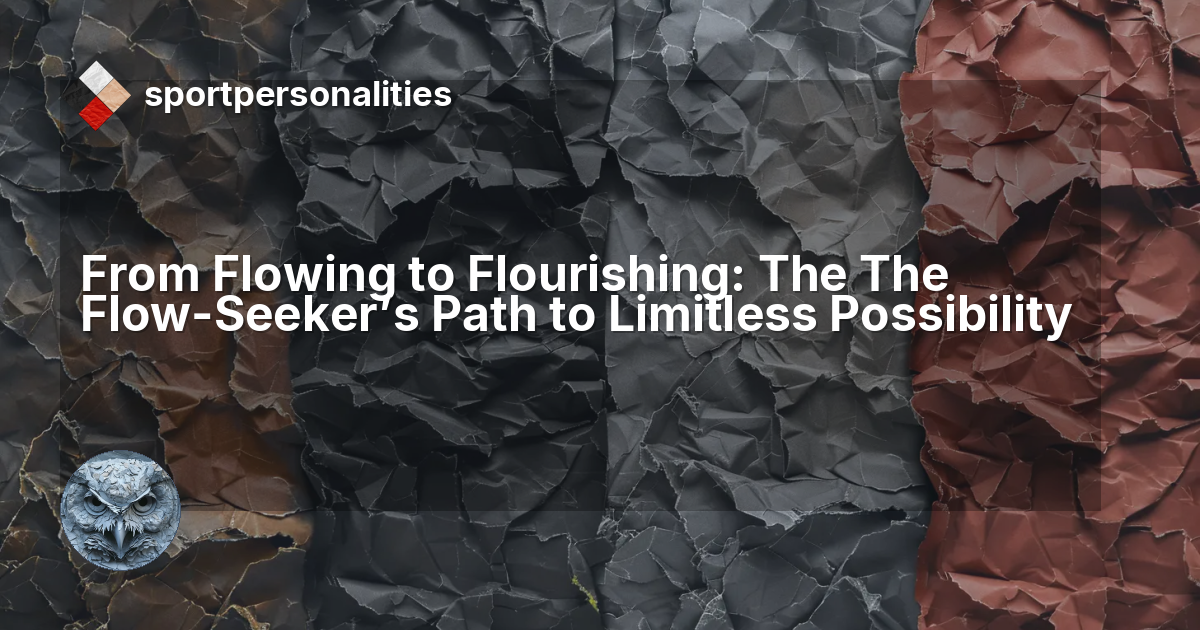The athletic world loves its flow state obsession. Every performance podcast, motivational post, and training guru preaches the gospel of "getting in the zone." Athletes with reactive cognitive approaches and intrinsic motivation hear this message constantly: chase the flow, find the flow, manufacture the flow on demand.
But here's what nobody tells Flow-Seeker athletes: trying to force flow is exactly what destroys it.
Athletes who process movement through bodily sensation and adaptive awareness face a peculiar paradox. Their natural gift, the ability to slip into transcendent performance states with remarkable ease, becomes a source of pressure when they start treating it like a light switch they should control. The more they chase those magical moments, the more elusive they become.
The Myth: Flow States Require Perfect Conditions
The conventional wisdom sounds reasonable enough. Athletes need the right environment, proper warm-up, specific rituals, and mental preparation to access peak states. Coaches design elaborate pre-performance routines. Sport psychologists prescribe breathing protocols and visualization sequences. The underlying message: flow is fragile, requiring careful construction.
This belief creates an entire industry of flow-hacking techniques. Athletes learn to manipulate variables, music selection, environmental factors, arousal levels, hoping to engineer transcendent experiences. The assumption runs deep: optimal performance states are destinations that athletes reach through deliberate navigation.
The problem isn't that these techniques never work. They do, sometimes. The problem is they transform flow from something that happens through athletes into something athletes must make happen. That subtle shift changes everything for those who rely on intrinsic motivation and autonomous social styles.
The Reality for Flow-Seeker Athletes
Watch athletes with reactive cognitive approaches during their best performances. They're not following scripts. They're not checking mental checklists. They've stopped trying entirely.
Their flow states emerge not from perfect conditions but from complete permission. Permission to trust their bodies. Permission to abandon plans when movement demands something different. Permission to stop monitoring whether they're "in the zone" and simply exist in the moment.
Athletes who combine intrinsic motivation with self-referenced competitive styles discover something counterintuitive: their peak states arrive most reliably when they stop chasing them. The transcendent moments they crave don't require elaborate setup. They require getting out of their own way.
These athletes struggle most when they adopt structured flow protocols designed for those with analytical cognitive approaches. When someone tells them to "execute the pre-performance routine exactly," they're fighting their natural processing style. Their strength lies in adaptive response, not rigid replication.
Why the Myth is Backwards
The ironic process theory explains this paradox perfectly (reference suggested). When athletes actively try to create specific mental states, they activate the very monitoring processes that prevent those states from emerging. Trying to "be in flow" requires standing outside the experience to evaluate it, the exact opposite of flow's defining characteristic of merged action and awareness.
Athletes with reactive cognitive approaches process athletic challenges through immediate bodily sensation rather than cognitive planning frameworks. Their optimal performance emerges from direct sensorimotor loops, body sensing, body responding, without conscious oversight. When they introduce elaborate mental protocols, they're essentially inserting a delay into their fastest pathway.
Those who rely on intrinsic motivation face an additional complication. External flow-chasing techniques often emphasize outcome goals, performance metrics, or comparative standards. But these athletes find their deepest engagement through the inherent satisfaction of movement itself. When they start viewing flow as a performance tool rather than an expression of their authentic athletic nature, they've already lost what makes them distinctive.
The autonomous  Social Style adds another layer. Athletes who train best through self-directed exploration resist prescriptive approaches that don't align with their internal experience. Being told exactly how to access flow feels like being handed someone else's map to their own inner landscape.
Social Style adds another layer. Athletes who train best through self-directed exploration resist prescriptive approaches that don't align with their internal experience. Being told exactly how to access flow feels like being handed someone else's map to their own inner landscape.
The Better Framework
Instead of constructing flow, athletes with reactive cognitive approaches and intrinsic motivation benefit from what might be called "flow-adjacent preparation." They create conditions that remove interference rather than manufacture specific states.
This framework recognizes flow as their default setting, not an achievement. When these athletes feel disconnected from transcendent performance, the question isn't "How do I get into flow?" but rather "What's preventing my natural state from emerging?"
Notice Interference Patterns
Athletes track what pulls them out of natural immersion. Is it outcome worry? Technique obsession? Comparison to others? Performance monitoring? Each athlete's interference signature is unique to their experience.
Build Permission Rituals
Rather than elaborate activation sequences, these athletes benefit from simple permission-granting practices. A single breath acknowledging "I trust my body." A brief physical reset shaking out tension. Something that signals "I'm allowed to stop trying now."
Practice Micro-Commitments
Instead of committing to "staying in flow" for entire performances, athletes commit to tiny windows of full presence. Three seconds of complete immersion. One movement sequence of pure trust. These brief commitments build capacity without the pressure of sustained perfection.
The framework also honors that flow states vary. Not every performance requires transcendence. Sometimes athletes with reactive cognitive approaches perform brilliantly while fully aware of technical details. Sometimes they're thinking strategically throughout. Flow becomes one possibility among many rather than the singular standard.
Rewriting Your Approach
Athletes with self-referenced competitive styles and intrinsic motivation can shift their relationship with flow states by treating them as feedback rather than goals. When transcendent moments arrive, they signal alignment between the athlete's authentic nature and their current athletic expression.
This means preparation focuses on authenticity rather than optimization. Before training or competition, these athletes ask: "What version of myself feels most genuine right now?" They allow that answer to shape their approach rather than forcing themselves into predetermined "optimal" states.
Discover Your Sport Personality
This article explores one of 16 profiles. Find out which one you are and unlock a personalized blueprint for your athletic journey.
Take the Free TestThe practice environment matters differently for these athletes. They thrive when training includes unstructured exploration time, moments where nothing is being measured, improved, or evaluated. This isn't wasted time. It's the space where their natural flow capacity stays accessible rather than becoming a performance demand.
Athletes who combine autonomous social styles with intrinsic motivation also benefit from protecting their athletic experience from excessive external input. Not every training session needs coaching feedback. Not every performance requires post-competition analysis. Sometimes the most powerful thing they can do is simply move and trust what emerges.
The ultimate reframe: flow states aren't achievements to pursue but birthright states to reclaim. Athletes with reactive cognitive approaches don't need to learn how to access transcendent performance. They need permission to stop interfering with what already lives inside them, the natural harmony between body, movement, and moment that drew them to athletics in the first place.
 The Flow-Seeker (ISRA)'s greatest strength isn't accessing flow, it's recognizing that flow has been accessing them all along.
The Flow-Seeker (ISRA)'s greatest strength isn't accessing flow, it's recognizing that flow has been accessing them all along.
This content is for educational purposes, drawing on sport psychology research and professional experience. I hold an M.A. in Social Psychology, an ISSA Elite Trainer and Nutrition certification, and completed professional training in Sport Psychology for Athlete Development through the Barcelona Innovation Hub. I am not a licensed clinical psychologist or medical doctor. Individual results may vary. For clinical or medical concerns, please consult a licensed healthcare professional.





